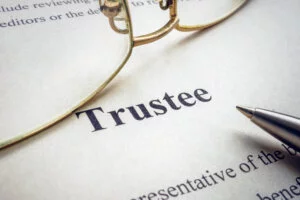What Rights Does a Beneficiary of a Will Have?

Contact
Table of Contents
As a beneficiary of a will, it’s a mistake to sit idly by and wait for your inheritance. A lot can go wrong between the time your loved one dies and the time distributions are made. It’s important to understand what rights you have and how to enforce them.
On this page, we answer the common questions that come up around a beneficiary’s legal rights. If you would like more information or specific advice on your situation, our probate lawyers will be happy to help.
What legal rights do beneficiaries have?
If you are a named beneficiary in a will, your principal right is to receive your share of the inheritance once the estate has been administered. Executors are responsible for distributing the estate according to the will’s terms.
To make sure you receive what is rightfully yours, you have two supporting rights that protect your interests:
- Right to information, so you can work out what you are entitled to and see the estate accounts.
- Right to challenge or remove executors, if you suspect they are acting dishonestly or failing in their duties.
Beneficiaries also have a right to challenge the will itself. You can do this if you think the will is invalid, perhaps because your loved one lacked mental capacity or was pressured into making the will, or because you are not properly provided for in the will (in which case you may have a claim under the Inheritance Act).
Please see our separate page for contesting a will.
What is the beneficiary’s right to information?
At some stage, the executors must notify the beneficiaries of their inheritance and tell them what they are entitled to receive under the will. There is no fixed rule about when executors must contact beneficiaries. Executors often wait until probate is granted, which can take several weeks. The grant of probate is the official document that gives executors the authority to deal with an estate’s assets.
Beneficiaries are entitled to limited information about the estate during probate. You can ask for information that demonstrates if the estate is being administered correctly, which usually means valuation documents and copies of the estate accounts (i.e. funds coming in and going in).
You do not have the right to look over the executor’s shoulder and micro-manage them. However, a competent executor will keep beneficiaries updated on progress, as it can often take 6-12 months to wind up an estate.
Do beneficiaries have a right to see the will?
Surprisingly, no, beneficiaries do not have the right to see a copy of the will. Executors will often supply a copy however, and the will becomes a public document once probate is granted so you can order a copy from the Probate Registry.
When can beneficiaries of a will see the estate accounts?
Beneficiaries of specific gifts like a piece of jewellery or a sum of money generally do not have the right to see the full estate accounts.
Residuary beneficiaries — those who inherit what remains after all debts, expenses and specific gifts have been paid out — have to sign off the accounts before the estate can be wound up. Executors should distribute the final estate accounts to you shortly before you receive you share of the inheritance.
Executors also have to show you the interim accounts if you ask for them. This is helpful if the administration is taking longer than expected and you want clarity on where things stand.
What other information can beneficiaries request?
As a beneficiary, you may want to see copies of emails or evidence the executor did what they said they would do, but you are not entitled to this information as of right. The executor has discretion over what information they share with beneficiaries.
It’s good practice for executors to make everything as transparent as possible, however. If you are worried that you are not getting enough information from an executor, we can help you request the information you are entitled to.
Can a beneficiary of a will challenge or remove an executor?
Beneficiaries can get frustrated when probate is not progressing as fast as they would like or they are not clear about what’s going on. Conflicts like these are often quickly resolved by talking things through. We can clarify everyone’s rights and responsibilities and help you establish clear guidelines for information-sharing and communication with the executor.
We can also help if you are worried about an executor’s honesty or feel they are mishandling the estate in some way. For example:
- Refusing to act
- Selling assets for less than their value
- Being reckless with money belonging to the estate
- Using estate assets for personal gain
- Paying beneficiaries before settling outstanding debts
Executors must act in the best interests of the estate and its beneficiaries. If you believe an executor is not doing this, we can help you explore your options for challenging them. This could include:
- Requesting a full inventory of the estate
- Applying to court to remove an executor
- Claiming against the executor personally to account for any losses
Can the beneficiaries of a will remove an executor?
Regardless of whether the executor’s misdeeds were intentional, beneficiaries have the right to seek the removal of an executor who is not fit for the job.
The Court will need clear evidence that the executor is not acting in your best interests, which may be the case if the executor has committed serious misconduct such as failing to pay creditors or stealing from the estate.
Executors cannot be forced to distribute an estate until one year has passed since the date of death. Even after this time, there may be legitimate reasons why the executor cannot distribute an estate, for example, there are foreign assets to recover or a property is still on the market. While this can be frustrating for beneficiaries, “taking too long” is unlikely to be a good enough reason to remove an executor unless there is evidence the executor is doing nothing at all.
You will need to take legal advice if you have concerns along these lines. Our dedicated contentious probate team will be able to advise you on the best course of action.
We’re here to help
If you would like help with exercising your legal rights as a beneficiary of a will, get in touch. Our specialist wills and probate team has extensive experience helping beneficiaries receive their inheritances and resolve any disagreements that come up. We can also help you defend your position if you’re an executor facing allegations from beneficiaries. To speak with one of our solicitors, contact us by:
- Filling in our online enquiry form; or
- Calling us on 020 7485 8811
Share this article
“The practice at Osbornes often acts for a wide range of HNW individuals and families on complex estate and trust cases, frequently dealing with cross-border estates.”
FAQs
What does an executor have to disclose to beneficiaries?
An executor has a duty to keep beneficiaries informed about the estate’s administration. This includes providing details on assets, liabilities, and how the estate is being distributed. While they don’t need to share every document, they should be transparent about major decisions, such as property sales or delays in probate. If beneficiaries have concerns about an executor’s actions, they can request an estate account summary which outlines all of the transactions that have been made as well as the final balance at the end of the estate administration process.
Can executors change a will?
No, executors can’t change the terms of a will. However, if all beneficiaries agree, changes can be made through a Deed of Variation. A deed of variation is sometimes used when beneficiaries want to split the assets more fairly or provide for someone who was not included in the will.
Contact us today
Call us 020 7485 8811
Email us Send us an email and we’ll get back to you
Osbornes has a young and dynamic team that is really going places. They have a real passion for private client work with the ability to deliver great results.
They have a personable, sensible but commercial approach.
Osbornes has good clients and an extremely capable team of private client litigators. All of the partners are excellent and the trainees are also very helpful.
We'd like to thank all of you for your professionalism in helping us deal with everything for the past 17 months. Even though our choice of law firm at the beginning was random, we're glad we came to you. We're very grateful that you're on our side and fighting for what's rightfully belongs to us! We couldn't have had a better lawyer representing us and we appreciate you more than you can imagine.
Jan Atkinson is responsive, reliable, fair, knowledgeable, experienced in cross-border estates, and very professional.
A full service team which punches above its weight, dealing with a range of UK and international clients.
The ability to look across the borders of UK law and take into account considerations and rules of other jurisdictions. That makes it very nice to work with each other.
A good understanding of the legal matter at hand and the ability to provide both legal and practical solutions for cross-border matters.
Jenny Walsh is a full member of STEP and a key figure who specialises in non-contentious private client matters, often with a cross-border dimension.
With a deep sense of gratitude, I want to thank you all for your diligent and comprehensive contributions and assistance in my legal travails.
I am sure you know how stressful legal proceedings can be for everyday laypersons like myself. Thankfully, you have been a bastion of support and reassurance during these trying months, and I struggle to find the right words to express my sincere gratitude.
Thank you from the bottom of my heart.
A private client team offering a range of services to assist with private client matters including trust and probate services. A friendly approach with a keen eye for detail.
I have been a client of this firm for a number of years and been impressed by particular individuals, the care and thoughtfulness with which they have worked.
An efficient firm which provides an excellent service at highly competitive charging rates.
The team receives a steady flow of instructions from high-net-worth individuals and families on an array of tax planning, wealth preservation, estate and succession planning issues
I think this firm has excellent strength and depth in this area, for both contentious and non-contentious work, and they can hold their own against any other firm.
I have found them to be incredibly knowledgeable and pragmatic in settling claims for their clients.
The contested estates team is strong with talented young solicitors doing good quality work
The nimble team acts for a broad range of high-net-worth individuals and families on a variety of complex estate and trust litigation.
Osbornes has a ‘strong private client department’ and ‘the firm seems to be going from strength to strength’.
Thank you for managing my case, following a complete fiasco before I contacted Osbornes Law. I know that the work involved was rather complicated, possibly frustrating and often time consuming. I was impressed with your current knowledge of the case when we had the first meeting at your office. I regard a face-to-face meeting as imperative in developing positive relationships. Members of your team, such as Alex and Ella were impressive too, with their efficient, friendly manner of working.
I am grateful for your patience, advice and excellent support at a difficult time. Hopefully it won't be necessary to contact you again regarding this matter! I will definitely use Osbornes Law in the future."Jan Atkinson, with her steely, steady, calming presence, instils confidence in the most highly-strung of us clients. With her masterful knowledge of the law, old and new, and its application, Jan can navigate through the most complex of cases to a successful end."
"I find Osbornes’ client-friendly approach welcoming and refreshing"
"A medium-sized London firm dealing with big litigation and doing it extremely well because of a depth of expertise and experience."
My family had the pleasure of Jan Atkinson working with us on the will and probate issues of [my mother's] estate in Camden and Ireland after she passed on last year. Jan and her assistant(s) offered us a fantastic service at a sad time.
"Jan Atkinson stands out for her wide-ranging knowledge and experience of estates; whatever problem you throw at her, she has seen it all before and is able to find a creative and sustainable solution. She has exceptional commitment to her clients and explores every avenue to find the best solution for them"
The team is very caring, experienced and detailed and was clear about the next steps and offered very helpful advice and suggestions
Jan Atkinson has extensive experience in private client matters, which underpins her excellent skills in the contentious probate area. Plus she is strong on international matters
A small but formidable team, punching above its weight. Jan Atkinson is a seasoned pro. Approachable but no push-over
"They are an outstanding firm to work with. They are consistently impressive in their work."
"Elspeth Neilson is very reliable and practical."
"The team frequently deals with cross-border estates for high–net-worth individuals."
"The team were extremely professional in putting my needs first. There was a joined-up approach to catering for the client, and all lawyers involved were briefed and constructive."
"Service prompt and effective. I have absolute confidence in Maggie."
I am happy with the service that I got and would recommend you to other potential clients.
I found Osbornes always very helpful and efficient.
We are very pleased with the services of Osbornes. Highly professional and through with close attention to detail.
I would highly recommend Jan Atkinson in any probate matter and Osbornes Solicitors in any other legal matters.
Jan Atkinson is a very proficient lady whom I would highly recommend to anyone involved in probates.
Thanks for all your work and explaining everything so clearly. For any legal matters in the future I would not hesitate in instructing Osbornes.
We have found your service to date as the most informative we have come across.
Jan Atkinson is confident with a straightforward approach. Her practice covers both contentious and non-contentious matters, including wealth planning and estate administration.
I would like to thank everyone in my case for the excellent job!
Related InsightsVIEW ALL
- 14.1.2026
Digital Assets Now Count in Your Will
Making a will now that digital assets are recognised as personal property We live in a sophisticated technological age, yet...
Read more - 11.12.2025
MoJ data indicates steep rise in probate claims
Why probate claims are increasing and what this means to families The chances of being involved in probate disputes are...
Read more - 15.8.2025
Assisting a Death and Inheritance
Assisted dying and inheritance: can beneficiaries disapply the forfeiture rule by agreement? The growing number of people with terminal illnesses...
Read more - 17.7.2025
Key Ruling on Foreign Inheritance Judgment
Foreign judgment setting aside English will could not be registered and enforced in England The contested probate team at Osbornes...
Read more - 9.12.2024
Executors’ and Administrators’ Duties
Introduction When someone dies, others need to take on the formal responsibility for dealing with the deceased’s estate. If...
Read more - 9.12.2024
What To Do When Someone Dies
When a loved one dies, getting to grips with what you need to do can seem bewildering. The first question...
Read more - 6.11.2024
High Court Validates Donation in Will Dispute
High Court validates gift made during Covid lockdown in Will Dispute In what may be one of the first covid...
Read more - 5.11.2024
Protecting Loved Ones with Dementia
If a person lacks capacity how should decisions be made for them? Dementia is a cruel disease, slowly robbing individuals...
Read more - 12.7.2024
Probate Mediation
Why choose mediation for contested probate? At Osbornes, we understand that probate litigation is often highly emotive. Unfortunately, there is...
Read more - 12.7.2024
Is A Handwritten Will Legal?
Is a handwritten will legal? Is a question we often hear, especially when time is of the essence, and putting...
Read more - 25.4.2024
A Guide to Will Trusts
What is a trust in a will ? Setting up a trust in your will can protect assets for your loved...
Read more - 25.4.2024
A Guide to Asset Protection Trusts
One good reason to place your assets into a trust is to protect family wealth without fearing for its future....
Read more - 25.4.2024
What is a Mirror Will?
Mirror wills are mirror images of each other and practically the same in every way. They suit couples, married or...
Read more - 23.4.2024
A Guide to Life Interest Trusts
In today’s complex families, protecting assets for your children while ensuring that a surviving spouse can still enjoy them...
Read more - 23.4.2024
Discretionary Trusts
What is a discretionary trust? With a discretionary trust, there is no automatic right for beneficiaries to receive funds from...
Read more - 23.4.2024
Disputes Between Executors and Beneficiaries
What are your rights? When a loved one dies, their beneficiaries understandably want to settle their affairs and receive their...
Read more - 22.4.2024
5 Things You Should Never Put in a Will
When it comes to writing a will, you want to make sure that your wishes are known and that the...
Read more - 22.3.2024
Forged Wills
Will fraud and forged wills are increasingly common. If the contents of a will comes as a surprise, then one...
Read more - 14.2.2024
What is Proprietary Estoppel?
What is Estoppel? In general terms, estoppels operate where one party has acted on the basis of a statement made...
Read more - 14.2.2024
Duties of Trustees
When setting up or running a trust it’s important to know what the trustees duties are. Trustees are key...
Read more - 3.11.2023
Deed of Variation: Making a Change to an...
What is a deed of variation? A deed of variation is a legal document which can be used to alter...
Read more - 31.10.2023
Constructive Trusts
Property rights are not always clear-cut. Sometimes, a person who does not legally own a property could be entitled to...
Read more - 17.9.2023
What is a Codicil to a Will?
Codicil to a will Life has a habit of changing and your will may need to change with it. A...
Read more - 31.8.2023
What Happens if Someone has Dementia and No...
Can you get Power of Attorney for someone with dementia? It’s a sad reality in an ageing population that...
Read more





























